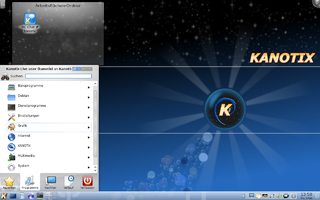A Linux distribution is an operating system made from a software collection that includes the Linux kernel and often a package management system. They are often obtained from the website of each distribution, which are available for a wide variety of systems ranging from embedded devices and personal computers to servers and powerful supercomputers.

A live CD is a complete bootable computer installation including operating system which runs directly from a CD-ROM or similar storage device into a computer's memory, rather than loading from a hard disk drive. A live CD allows users to run an operating system for any purpose without installing it or making any changes to the computer's configuration. Live CDs can run on a computer without secondary storage, such as a hard disk drive, or with a corrupted hard disk drive or file system, allowing data recovery.

Kanotix, also referred to as KANOTIX, is an operating system based on Debian, with advanced hardware detection. It can run from an optical disc drive or other media i.e. USB-stick without using a hard disk drive.

A light-weight Linux distribution is one that uses lower memory and/or has less processor-speed requirements than a more "feature-rich" Linux distribution. The lower demands on hardware ideally result in a more responsive machine, and/or allow devices with fewer system resources to be used productively. The lower memory and/or processor-speed requirements are achieved by avoiding software bloat, i.e. by leaving out features that are perceived to have little or no practical use or advantage, or for which there is no or low demand.

Ubuntu is a Linux distribution derived from Debian and composed mostly of free and open-source software. Ubuntu is officially released in multiple editions: Desktop, Server, and Core for Internet of things devices and robots. The operating system is developed by the British company Canonical and a community of other developers, under a meritocratic governance model. As of October 2024, the latest interim release is 24.10, with most-recent long-term support release is 24.04.
Puppy Linux is a family of light-weight Linux distributions that focus on ease of use and minimal memory footprint. The entire system can be run from random-access memory (RAM) with current versions generally taking up about 600 MB (64-bit), 300 MB (32-bit), allowing the boot medium to be removed after the operating system has started. Applications such as AbiWord, Gnumeric and MPlayer are included, along with a choice of lightweight web browsers and a utility for downloading other packages. The distribution was originally developed by Barry Kauler and other members of the community, until Kauler retired in 2013. The tool Woof can build a Puppy Linux distribution from the binary packages of other Linux distributions.
Technical variations of Linux distributions include support for different hardware devices and systems or software package configurations. Organizational differences may be motivated by historical reasons. Other criteria include security, including how quickly security upgrades are available; ease of package management; and number of packages available.

puredyne is a discontinued live Linux distribution based on Ubuntu and Debian Live and dedicated to live audio-and-visual processing and streaming. Its focus was on the Pure Data audio synthesis system as well as SuperCollider, Csound and others, plus live video-processing systems such as Processing and Fluxus. It also included hardware related software such as arduino and came bundled with home-studio and graphic design software.
mklivecd is a script for Linux distributions that allows for one to compile a "snapshot" of the current hard drive partition and all data which resides in it and compress it into an ISO 9660 CD-image. This allows easy backup of a user's data and also makes it easy to create customized Linux-distribution. Some Linux-distributions like PCLinuxOS include a graphical frontend for easier script usage.

Software remastering is software development that recreates system software and applications while incorporating customizations, with the intent that it is copied and run elsewhere for "off-label" usage. The term comes from remastering in media production, where it is similarly distinguished from mere copying.

Wubi is a free software Ubuntu installer, that was the official Windows-based software, from 2008 until 2013, to install Ubuntu from within Windows, to a single file within an existing Windows partition.

remastersys is a free and open-source program for Debian, Ubuntu-based, Linux Mint or derivative software systems that can:

AcetoneISO is a free and open-source virtual drive software to mount and manage image files. Its goals are to be simple, intuitive and stable. Written in Qt, this software is meant for all those people looking for a "Daemon Tools for Linux". However, AcetoneISO does not emulate any copy protection while mounting.

The TurnKey Linux Virtual Appliance Library is a free open-source software project which develops a range of Debian-based pre-packaged server software appliances. Turnkey appliances can be deployed as a virtual machine, in cloud computing services such as Amazon Web Services or installed in physical computers.

Dracut is a set of tools that provide enhanced functionality for automating the Linux boot process. The tool named dracut is used to create a Linux boot image (initramfs) by copying tools and files from an installed system and combining it with the Dracut framework, which is usually found in /usr/lib/dracut/modules.d.

SparkyLinux is a desktop-oriented operating system based on the Debian operating system. The project offers a ready to use operating system with various desktops to choose from. SparkyLinux is released 3-4 times per year to provide the latest versions of all applications.

MX Linux is a Linux distribution based on Debian stable and using core antiX components, with additional software created or packaged by the MX community. The development of MX Linux is a collaborative effort between the antiX and former MEPIS communities. The MX name comes from the "M" in MEPIS and the "X" in antiX — an acknowledgment of their roots. The community's stated goal is to produce "a family of operating systems that are designed to combine elegant and efficient desktops with high stability and solid performance".













